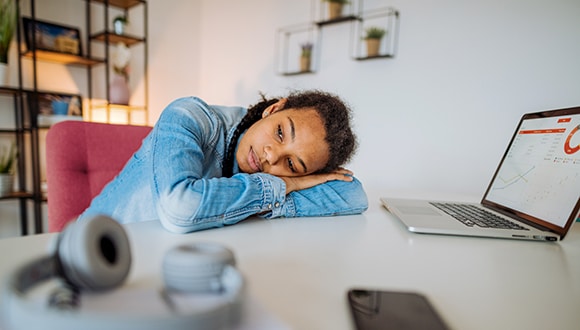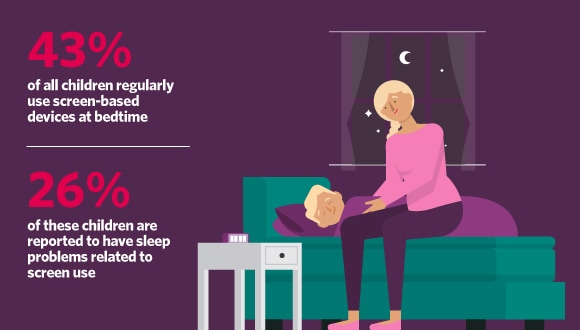How much sleep do teenagers really need?
Updated September 2023 | 4 min read
Expert contributor Dr Chris Seton, paediatric and adolescent sleep specialist
Words by Lindy Alexander
Is your teenager sleeping in most days struggling to get out of bed, or perhaps they're staying up late unable to get to sleep? We explore how much sleep teenagers need and what you can do to encourage good-quality sleep habits.
Sleep guidelines recommend teenagers aged 14 to 17 years need to get eight to 10 hours of sleep a night. "The teenage years are the only time when the need for sleep doesn’t decrease as you get older," says Dr Chris Seton, paediatric and adolescent sleep specialist at the Woolcock Institute of Medical Research. "Whether your teen is 12 or 18 years old, they’ll need an average of nine hours’ sleep each night."
Why is sleep important for teens
Large numbers of Australian children and teenagers are sleeping fewer hours than the recommended minimum, which is having an impact on their growth, learning, development and mental health.
Dr Seton says quality sleep is fundamental to good mental health. Adolescents who aren’t getting enough sleep are more likely to show symptoms of anxiety and depression, have low self-esteem and are less likely to rate themselves as ‘happy’.

How a lack of sleep affects teenagers
There are some common signs your teen may not be getting enough sleep. “Most parents want to know if their moody, grumpy teenager is sleep deprived or if it’s just genetic,” says Dr Seton. He suggests your teen may have a sleep problem if they’re very difficult to wake on school mornings, are crankier and more tired in the mornings than at bedtime and have big sleep-ins on the weekend.
Other signs of sleep deprivation in teens include:
- difficulty concentrating
- moodiness
- being slow to get going in the morning
- low impulse control.
Teenagers and sleep issues
As your teen grows, they may want to change their sleep routine, but hormones can also play a part. Teenagers start to secrete melatonin, a hormone that regulates the body’s sleep-wake cycle, later at night than they did in earlier childhood, which affects their circadian rhythms. Also, as their brains mature during puberty, they can stay awake for longer.
More serious reasons teens don't get enough sleep include disorders like sleep apnoea, which occurs when a person’s throat is partly or completely blocked during sleep, or restless leg syndrome, a condition of the nervous system where you have the urge to move your legs to relieve unpleasant sensations. Speak to your GP if you think your teen may be experiencing these issues.
Lifestyle factors also play a role in a teenager’s ability to get enough sleep, and they include:
- spending too much time on digital devices (recommended screen time in Australia is less than two hours for children five to 17 years)
- after- and before-school activities
- doing schoolwork late into the night
- light exposure from television, smartphones or computers
- high-caffeine intake (coffee or energy drinks)
- stress.
Dr Seton acknowledges the multiple reasons teenagers can experience sleep deprivation but says too much screen time is a major factor. “The portability and availability of phones, laptops and tablets means many teens are using these devices on their beds. This trains their brain to associate their bed with fun and excitement, rather than sleep time,” he says. The blue light emitted from screens may impact a teen’s ability to switch off at bed time.

Source: RCH National Child Health Poll
Encouraging good sleep habits for teens
Good-quality sleep habits for teens aren't about banning screens altogether, says Dr Seton. "You can’t prohibit devices, but you do need a healthy balance," he explains. "Part of the treatment I offer is certainly to limit screens, but that’s not an immediate fix."
Parents can set healthy sleep habits by taking these five steps.
- Establish sleep patterns early
"As children move from lower to upper high school their sleep requirements don’t change, but often they’ll do more homework, gain more independence and spend more time on social media, leaving less time for sleep," says Dr Seton. "Set sleep expectations and patterns early – it’s much easier to start when they’re 13-years-old than at 16 or 17." - Have a wind-down routine before bed
Turn off screens one hour before bedtime. "This allows the brain and body time to get ready for sleep," explains Dr Seton. Teens can spend this hour doing other activities like reading, having a warm bath or practising meditation. - Bring bedtime earlier – slowly
Dr Seton suggests a longer term approach. "If kids are going to sleep at 1am you can’t suddenly tell them to go to bed at 10.30pm because they’ll lie awake and become anxious, frustrated and annoyed. Bring bedtime earlier by five or 10 minutes each night," he says. - Brainstorm
Talk to your teen about ways they think they can get their minimum number of hours of sleep and draw up an agreement. - Set a good example
Parents are powerful role models and play a big part in showing what good sleep hygiene looks like. Do this by removing devices from your own bedroom overnight and placing value on a good night’s sleep.
Need more advice about teenagers and sleep?
If you have concerns about your teenager’s sleep, you can get professional help from a counsellor, your GP or a psychologist specialising in sleep issues.
And don’t forget to use these trusted online resources about teenagers and sleep:
Support for a better night's sleep
Thanks to our partnership with Sleepfit Solutions, eligible HCF members* can get a 20% discount on a 12 month subscription to the Sleepfit app, designed to improve sleep and overall wellbeing.
Related Articles
SCREEN AND YOUR HEALTH?
A psychologist shares how to have a healthy relationship with technology.
BLUE LIGHT FILTERS ON GLASSES
Experts explain how blue-light blocking lenses work and if you should get them for own glasses.
BODY CLOCK AND YOUR HEALTH
Understanding your circadian rhythm can help you make healthier choices.
CAFFEINE AND TEENAGERS
Aussie teens drink a surprising amount of caffeine. Here’s how it affects their health.
IMPORTANT INFORMATION
* Eligible HCF members with hospital or extras cover. Excludes Overseas Visitors Health Cover. The cost is $23.90 for 12 months for HCF members (RRP is $29.90).
This communication contains information which is copyright to The Hospitals Contribution Fund of Australia Limited (HCF). It should not be copied, disclosed or distributed without the authority of HCF. Except as required by law, HCF does not represent, warrant and/or guarantee that this communication is free from errors, virus, interception or interference. All reasonable efforts have been taken to ensure the accuracy of material contained on this website. It’s not intended that this website be comprehensive or render advice. HCF members should rely on authoritative advice they seek from qualified practitioners in the health and medical fields as the information provided on this website is general information only and may not be suitable to individual circumstances or health needs. Please check with your health professional before making any dietary, medical or other health decisions as a result of reading this website.